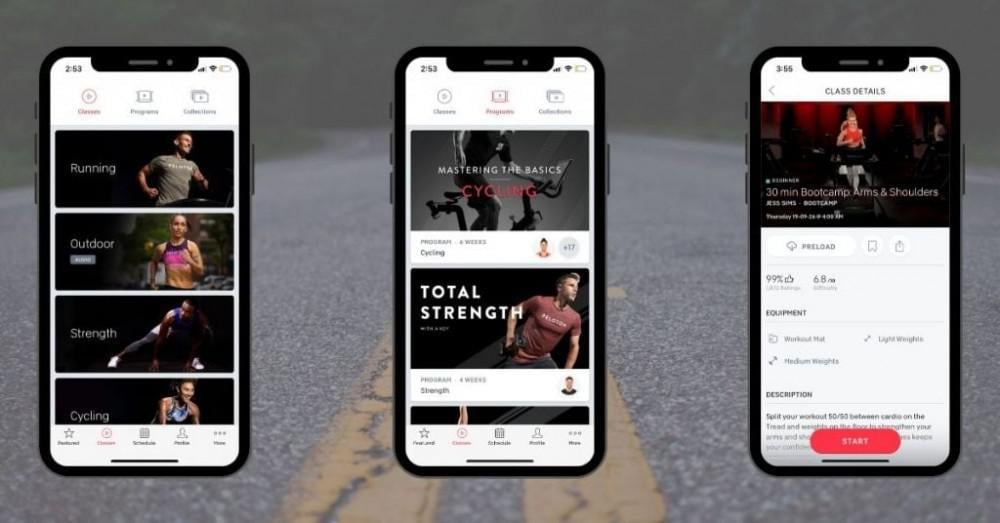
The half marathon distance is often considered the sweet spot for runners. It’s long enough to be an enticing challenge and admirable achievement without requiring the substantial time, energy, and physical toll demanded by a full marathon.
The half marathon distance is 13.1 miles. It is so named because it’s half of a full marathon, which is 26.2 miles.
Many runners who may have already completed a 5k or 10k can train to the 13.1-mile distance over just 8-12 weeks of training. But, even if you’re starting from square one or have been inactive for quite some time, you may be able to successfully train to run 13.1 miles in just 16 to 20 weeks.
Of course, running 13.1 miles can certainly sound daunting if you’ve never run more than a couple of miles without stopping. That said, with a great training plan and a positive mindset, almost anyone can complete the half-marathon distance if they’re committed to training consistently.
If the idea of tackling the half marathon distance has piqued your interest and has you dreaming of triumphantly crossing the finish line, we’ve put together a comprehensive beginner’s guide to half marathons below.
Let’s dive in!
How Long Is a Half Marathon?
The half marathon distance is approximately 13.1 miles or 21.1 kilometers.
Half marathon races are held all around the world — from Antarctica to Australia, Asia to Central America.
But you don’t need to go grab your passport to run a half marathon. Depending on where you live, there are likely numerous half marathons in your town or closest big city.
Indeed, after 5ks, half marathons are the most popular race distance in the US.
How Long Does It Take to Run a Half Marathon?
The average half marathon time for males is between 20 and 40 years old is approximately 2 hours, and for women, the average finish time is 2 hours and 20 minutes.
How Fast Is a 2-Hour Half Marathon?
Crossing a half marathon finish line in 2 hours is a common goal for many beginner runners.
To run a 2-hour half marathon, you’ll need to maintain an average pace of 9:09 per mile (5:41 per kilometer).
Keep in mind that just because breaking 2 hours in a half marathon is a common goal, you should feel accomplished no matter what your half marathon finish time is come race day. Also remember, some courses are easier to run a fast half marathon on because they’re flat and at lower elevation; that’s all to say, where you’re running your race plays into how quickly you’ll run it.
How Fast Is a 1 Hour 30 Minute Half Marathon?
Many intermediate runners have the goal of running under 90 minutes. This is especially true for runners who are a bit more serious about their training and who already have a few half marathons under their belt.
To run a half marathon in 1 hour 30 minutes, you’ll need to run at an average pace of 6:52 minutes per mile (4:16 per kilometer).
Can You Run a Half Marathon in an Hour?
To finish 13.1 miles in 60 minutes or less, you’d need to run 4:35 minutes per mile (2:51 per kilometer).
Obviously, this is really hard. Typically, only elite runners or very experienced runners finish close to this time.
In fact, the fastest half marathon and current world record half marathon is not that much faster than one hour. Just recently, on October 27, 2024, Ethiopia’s Yomif Kejelcha broke the previous world half marathon record at the Medio Maratón de Valencia Trinidad Alfonso Zurich, when he ran a blazing 57:30 for the half marathon distance.
How to Train for a Half Marathon
So, now that we’ve covered the basics about how far a half marathon is and how long it takes to finish a half marathon, let’s dive into how to get to the starting line (and finish line!) of your first half marathon.
Training for a half marathon may seem intimidating at first, especially if this will be the furthest you’ve ever run.
But sticking to a half marathon training plan will:
- Provide you with the confidence to finish the distance
- Increase your endurance and overall fitness
- Allow you to set your best possible half marathon time
Here are the best tips for how to train for a half marathon:
1. Use a training plan
Following a training plan is the best way to make sure you’re ready for your race.
We have a number of half marathon training plans ranging from 8 weeks to 20 weeks. We recommend giving yourself at least 16-20 weeks to train if you’re a beginner, or have only run a handful of 5ks. This will help ease your body into the demands of the sport and impact.
You can search our training plans to find the right half marathon schedule for you.
2. Use a training app
Of course, we highly recommend our own half marathon training programs as they are designed by experts at the half marathon distance, but you can also use alternative plans or a running app like Runna.
The Runna app creates personalized training plans for every fitness level and race distance. The app specializes in holistic support and dynamic training plans crafted by experts, and includes cross-training for strength and conditioning.
3. Create your own plan
We strongly encourage first-time half marathon runners to follow a training plan designed by a coach or an app like Runna to reduce your risk of injury and improve your performance. However, if you really don’t like the rigidity of pre-set plans, you can create your own.
A good DIY training plan should include a mix of:
- A weekly long training run
- Tempo runs
- Shorter interval training speed workouts (e.g., running 400 meters, 800 meters, or 1-mile distance repeats)
- Strength & conditioning cross-training workouts
A mix of sessions is needed to facilitate the right training adaptations. This will make running 13.1 miles that much easier (and faster).
For example:
- Shorter interval efforts and mile repeats increase your VO2 Max — that’s a fancy way of saying your aerobic capacity.
- Running at a faster pace will improve running economy and make you a more efficient runner. That means using better running form, as well as physiological adaptations such as an increased number of red blood cells (more oxygen to supply the body).
- Running for longer distances will increase your slow-twitch muscle fiber density, which will improve your muscular endurance.
How to Have a Successful Half Marathon
Training for your first half marathon can be tough.
You will spend a lot of time training and consistency is key.
Start with building a habit of running consistently and increasing your distances and don’t worry yet about “tempo runs,” “mile repeats,” or running on hilly terrain.
We’ve put together a few tips for successful half marathon training:
1. Be consistent with your training
If you’re not consistent with your training (i.e., you miss several runs a week because you’re taking too many rest days), then you inevitably make the event that much harder. Your body won’t be prepared and you increase your risk of injury.
A well-designed half marathon training plan balances rest with harder efforts, and it builds in volume and intensity (how far and how hard you are running).
Follow your schedule and be consistent in your running routine.
Choose a training plan that fits your lifestyle.
It sounds obvious, but if your half marathon training plan isn’t sustainable, you won’t follow it.
A sustainable plan is one that you have time for and is appropriate for your fitness level.
2. Dial in your nutrition

When people think about half marathon nutrition, they often focus on what to eat on race day.
And while your half marathon fueling plan is critical, what you eat before your training runs and for your everyday diet during training is even more important.
- Eat plenty of protein to support recovery and consume plenty of carbs to fuel your runs.
- Include healthy fats like avocados, nuts, and seeds.
- Avoid highly processed foods.
- Consume enough calories to fuel your body for training. Focus on whole, natural foods from a variety of food groups.
Related: The Best Breakfasts for Runners
3. Prioritize rest and recovery
Training for a half marathon is tiring. You’re spending hours on your feet completing long runs, tempo runs, and intervals. Plus, running is a high-impact activity, so it is hard on your bones. andjoints. A good half marathon training program also includes strength training.
Compound that with your daily commute, family responsibilities, and your job, and it won’t be long before you can’t wait to hit the pillow every evening.
Therefore, it’s essential to prioritize rest and recovery.
Make sure you are getting enough sleep every night and staying as consistent with your sleep schedule as you are with your workouts.
4. Pace yourself properly
A lot of new runners tend to set off too quickly and then pay the price later in the race or training session.
A good pacing strategy is key.
Practice your pacing during training. The best time to do this is during your weekly long run.
Learning to better pace yourself helps you achieve your running goals.
We recommend wearing a running watch or using the Runna or Strava smartphone app to measure your pace.
Much of successful pacing comes down to experience, but it’s generally better to start out slower than you think you need to. You can always run faster in the second half if you’re feeling strong.
Mistakes to Avoid When Training for a Half Marathon
A lot of runners make the following mistakes when training for their first half marathon race:
1. Running the bulk of your weekly mileage in one session
A big mistake we see many people make is running the bulk of their weekly mileage in one session — usually the weekly long run.
While it’s important to get time on your feet, try not to run more than 30% of your weekly miles in one run.
For example, if you run 30 miles for the entire week, your long run should be no more than 9 miles.
Your weekly mileage will increase over your training program until the week or two before the race (called the taper).
2. Skipping strength training

Research shows that including 2-3 strength training sessions/per week increases running efficiency over an 8-12 week period [1,2].
But that’s not all.
Adding strength training sessions to your training will likely reduce your risk of injury. And with 24% of half marathoners and 30% of full marathon runners reporting injury during or 2 weeks after their event [3], a weightlifting session once or twice a week doesn’t sound like a bad investment of time and energy.
3. Missing a session and then jumping into the progressive version
If you miss a session, perhaps a weekly long run or mile repeats, don’t try to make up the miles in your next workout.
Also, don’t skip the progression and move on to the more difficult version.
For example, if you miss your workout of 4×1 mile repeats but you’re supposed to do 5 x 1 mile repeats the following week, do the 4×1 instead that week instead.
Progressing too soon without the proper training increases your risk of injury.
4. Not investing in the proper running gear
If you’re going to be participating in a half marathon, you need good running shoes. You can read our recommendations on the best half marathon running shoes.
Also, consider safety products and recovery products. But, the shoes are the most important above all else.
FAQs
How Many Miles Is a Half Marathon?
What Is the Average Time for a Half Marathon for a Man?
What Is a 10K in Miles?
What Is Full Marathon Distance?
What Is a Realistic Time for a Half Marathon?
—
References:
- Balsalobre-Fernández, C., Santos-Concejero, J. and Grivas, G.V., 2016. Effects of strength training on running economy in highly trained runners: a systematic review with meta-analysis of controlled trials. Journal of strength and conditioning research, 30(8), pp.2361-2368.
- Blagrove, R.C., Howatson, G. and Hayes, P.R., 2018. Effects of strength training on the physiological determinants of middle-and long-distance running performance: a systematic review. Sports Medicine, 48, pp.1117-1149.
- Mohseni, M.M., Filmalter, S.E., Taylor, W.C., Vadeboncoeur, T.F. and Thomas, C.S., 2021. Factors associated with half-and full-marathon race-related injuries: a 3-year review. Clinical journal of sport medicine, 31(5), pp.e277-e286.





